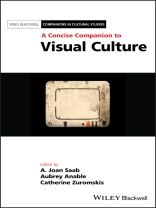Provides an up-to-date overview of the present state Visual Cultural Studies, featuring new original content, topics, and methods
The Wiley Blackwell Concise Companion to Visual Culture brings together original research by both established scholars and new voices in the dynamic field, exploring the history, current state, and possible future directions of visual cultural studies. Organized as a series of non-traditional keyword essays, this innovative volume engages readers with a diversity of ideas and perspectives to broaden and enrich their understanding of visual culture and its operations.
This accessible, reader-friendly volume begins with a brief introduction to the history and practices of visual studies, featuring interviews and conversations with key figures such as W.J.T. Mitchell and Douglas Crimp. The majority of the text explores key concepts within a broad framework of history, ecologies, mediations, agencies, and politics while placing particular emphasis on interdisciplinarity and intersectionality. Essays cover keyword topics including Identities, Representation, Institutions, Architectures, Memes, Environment, Temporality, and many more. Offering a unique approach to the subject, this timely resource:
* Presents new work from a diverse group of scholars with a broad range of social, cultural, and generational perspectives
* Emphasizes the importance of activism and political urgency in humanities scholarship
* Discusses engaging objects and discourses beyond film and art, such as architecture, video games, political activism, and the nonhuman
* Highlights the diverse and interconnecting elements of visual culture scholarship
* Includes case studies and short introductions that provide context and reinforce core concepts
The Wiley Blackwell Concise Companion to Visual Culture is essential reading for advanced undergraduate students, graduate students, and scholars in the fields of visual studies, art history, film studies, and media studies.
Tabela de Conteúdo
Acknowledgments xi
Notes on Contributors xiii
Introduction 1
A. Joan Saab, Aubrey Anable, and Catherine Zuromskis
Part I Scenes from the Institutionalization of the Field
1 Practices of Visual Culture Pedagogy 9
Lisa Cartwright and Marita Sturken
2 Horizontal Thinking and the Emergence of Visual Culture 21
Louis Kaplan
3 An Interview with W. J. T. Mitchell 39
4 A Conversation with Douglas Crimp 45
5 A Dialogue 51
Richard Meyer and Jon Davies
6 Scene Selection: Objects Lost and Found 67
Sharon Willis
Part II Key Concepts
A. Histories
Introduction 79
A. Joan Saab
7 The Archive 81
Jane Blocker
8 Observance 97
Marquard Smith
9 Temporality 117
Joel Burges
10 Ephemerality 137
Kate Palmer Albers
B. Ecologies
Introduction 155
Catherine Zuromskis
11 Environment 157
Ross Barrett
12 Architectures 177
Irene Cheng
13 Sites 201
Norman Vorano
14 Vernaculars 221
James J. Hodge
C. Mediation
Introduction 239
Aubrey Anable
15 The Document 241
Franny Nudelman
16 Form 259
Eugenie Brinkema
17 Play 277
Braxton Soderman
18 Memes 295
Margot Bouman
D. Agencies
Introduction 313
A. Joan Saab
19 Subjects 315
Eve Meltzer
20 Making 335
Laurie Beth Clark and Michael Peterson
21 Institutions 357
Sarah E. K. Smith
22 Species 375
Gloria C. S. Kim
E. Politics
Introduction 391
Catherine Zuromskis
23 The Social 393
Lane Relyea
24 Identities 403
Derek Conrad Murray
25 Representation 421
Chad Elias
26 Feelings 441
Scott C. Richmond
27 Action 459
T. J. Demos
Index 477
Sobre o autor
A. Joan Saab is the Susan B. Anthony Professor of Art and Art History and the Vice Provost of Academic Affairs, University of Rochester, USA. She is the author of For the Millions: American Art and Culture Between the Wars, Objects of Vision: Making Sense of What We See, and the digital project Searching for Siqueiros.
Aubrey Anable is Associate Professor of Film Studies, School for Studies in Art and Culture, Carleton University, Ottawa, Canada. She is the author of Playing with Feelings: Video Games and Affect. Her research on digital media history and aesthetics, video games, and theories of affect has appeared in the Feminist Media Histories, Afterimage, Television & New Media, Ada, and various edited collections.
Catherine Zuromskis is Associate Professor, School for Photographic Arts and Sciences, Rochester Institute of Technology, USA. She is the author of Snapshot Photography: The Lives of Images and The Factory. Her writings on photography, film, and visual culture have appeared in American Quarterly, Archives of American Art Journal, Art Journal, The Velvet Light Trap, Photography & Culture, Criticism, and various edited volumes.












